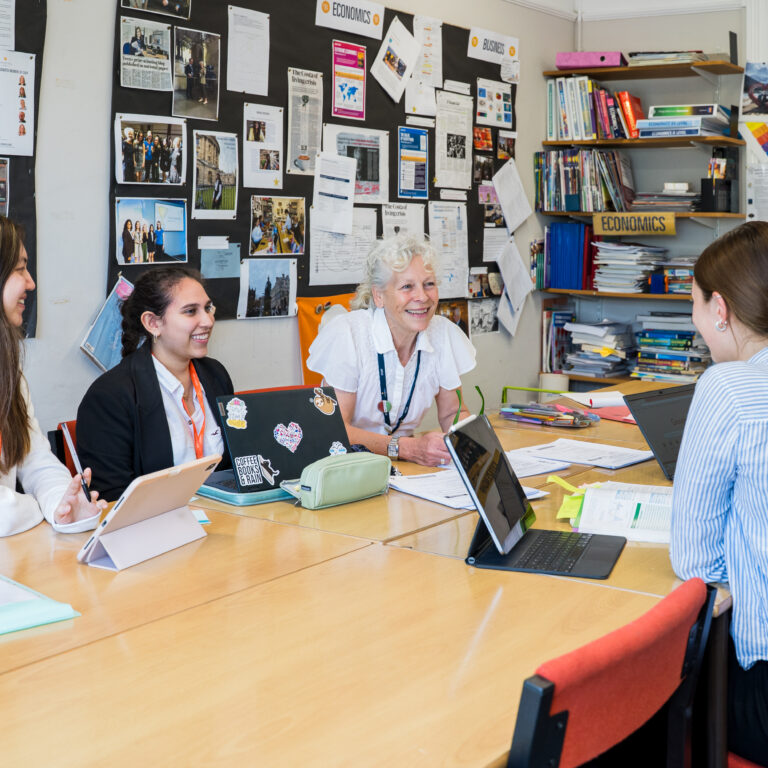Personal Guidance for a Transformative Stage
Pastoral care in the Sixth Form is designed to meet the distinct needs of young women navigating the pivotal years between 16 and 18. This can be a period of excitement, ambition, and increasing independence — but also one of pressure and challenge. Our role is to provide the structured, responsive and compassionate support that enables each student to thrive academically, socially and emotionally.
At the heart of this provision is a team of highly skilled and specially selected tutors who work closely with students throughout Lower and Upper Sixth. Their daily contact, one-to-one conversations and academic oversight ensure that each tutor has a clear, holistic understanding of their tutees’ wellbeing, aspirations and progress. They are the first point of contact for parents and act as the steady anchor for each girl as she moves through her A Level journey.
Small Groups, Strong Relationships
Tutor groups in the Sixth Form include no more than ten students, allowing tutors to form meaningful, individualised relationships with each member of their group. These close-knit groups foster a culture of trust, open dialogue and mutual support, helping students learn from — and encourage — one another.
This personalised tutor support works hand-in-hand with the academic guidance provided by subject specialists. Together, they build confidence, resilience and independence, helping girls develop the self-management, problem-solving skills and sense of responsibility they will need for university and beyond.
A Nurturing Sixth Form Community
The pastoral care network within the Sixth Form is extensive. Tutors are supported by the Head of Sixth Form and Assistant Head of Sixth Form, both of whom are highly visible throughout the school day and readily available for advice, reassurance or direction. Beyond this, students also benefit from access to:
-
the School’s wider pastoral leadership team, including the Senior Pastoral Lead and Head
-
the on-site School Nurse
-
the School Counsellor
-
an independent listener
-
a native-language speaker for international students
This layered structure ensures girls always have someone they can turn to, whether the need is academic, emotional, practical or personal.
Independence with a Safety Net
One of our primary goals is to guide girls towards genuine independence. Throughout Sixth Form, we encourage students to take ownership of their time, organisation, study habits and wellbeing. Tutors model self-reflection, personal planning and constructive challenge, helping girls identify when to take the initiative and when to seek support.
Cedar Lodge — our dedicated Sixth Form centre — plays a central role in this development. With spacious common rooms, shared working areas, independent study spaces and communal kitchens, it provides a professional and relaxed environment where students can manage their day, collaborate with friends, or take much-needed breaks. It is a hub for social connection, informal discussion, and the healthy balance of “work hard, play hard” that we actively encourage.
Wellbeing, Enrichment and Healthy Lifestyle
A successful Sixth Form experience extends far beyond academic results. We place strong emphasis on maintaining wellbeing through:
-
regular physical activity and sport
-
access to fitness facilities and active enrichment
-
guidance on healthy lifestyle and nutrition
-
co-curricular activities that offer creativity, leadership and reflection
-
opportunities for volunteering, mentoring younger students, and contributing to school life
These experiences build confidence, broaden perspectives, and help students manage the pressures of Sixth Form study while sustaining a healthy, balanced routine.
SEND Support in the Sixth Form
Our SEND provision continues seamlessly into Sixth Form, ensuring that girls with additional needs receive consistent, tailored support throughout their time at Burgess Hill Girls.
Guided by the SEND Code of Practice (2014), our approach emphasises independence, student voice and personalised strategies that enable each girl to fully access the curriculum.
Key elements of Sixth Form SEND support include:
Identification and Review:
Ongoing assessment, teacher feedback and student self-reflection help identify emerging or continuing needs. The SENCo works closely with Sixth Form staff to ensure adjustments remain appropriate.
One Page Profiles (OPPs):
These capture strengths, needs and best strategies for support. Updated termly, they are shared with teaching staff and used to guide classroom and study expectations.
Graduated Approach:
The Assess–Plan–Do–Review cycle continues through Sixth Form, ensuring strategies remain dynamic and responsive.
Collaboration with Students:
Sixth Formers take a more active role in discussions about their learning profile, encouraging independence and self-advocacy.
Specialist Guidance:
Where necessary, external professionals may be consulted for additional insight or recommendations.
Transition to Higher Education:
We work closely with students and parents to support applications for Disabled Students’ Allowances (DSA), exam arrangements, or other university-level support systems.
Our priority is to ensure every student — whatever her needs — feels empowered, understood and equipped for the next stage of her education.




